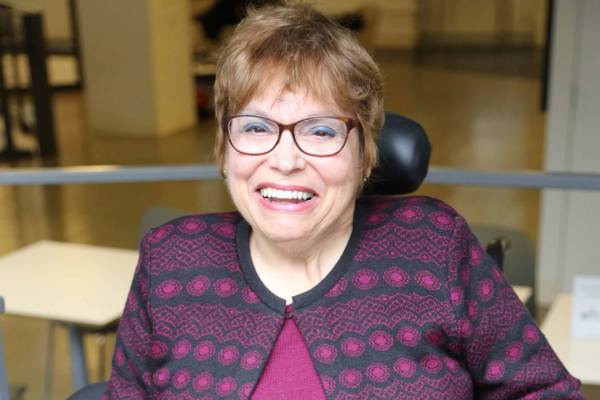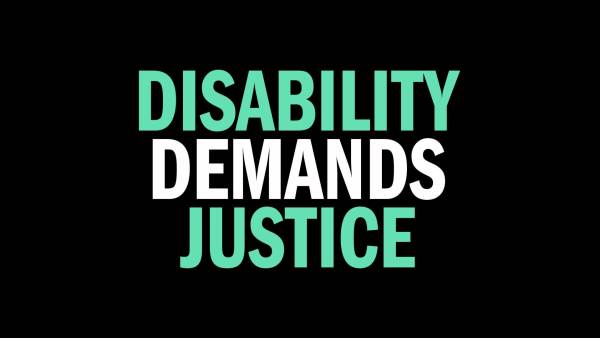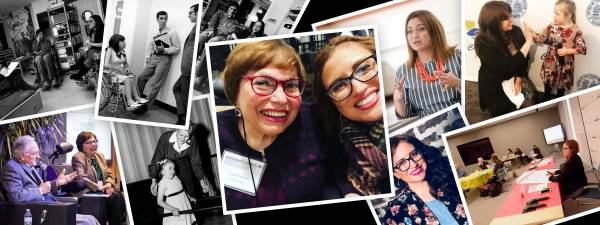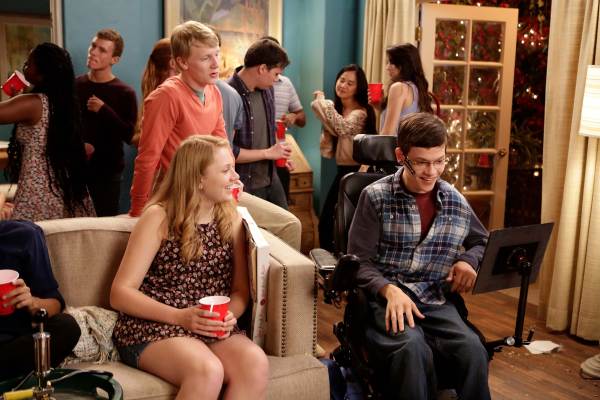Heumann nature: The life and legacy of disability rights activist Judy Heumann

Transcript
FAYE GINSBURG: Judith Heumann, you are an amazing and unrepentant badass. [applause]
NARRATOR: Judy, known as the mother of the disability rights movement, is introduced as NYU’s 2021 Commencement speaker.
FAYE GINSBURG: And I’m not the first person to tell you that. [applause]
NARRATOR: 1988, Judy addresses a joint House-Senate hearing on the Americans with Disabilities Act.
JUDY HEUMANN: People in our society have been raised with prejudicial attitudes that have resulted in extreme discrimination.
[Footage from one of Judy’s YouTube videos.]
OFF-CAMERA INTERVIEWER: Judy, what do you think is your biggest strength?
JUDY HEUMANN: That I’m a networker, I like to speak with people, and I like to help people.
OFF-CAMERA INTERVIEWER: And what’s your biggest weakness?
JUDY HEUMANN: That I’m a networker, I like to speak with people, and I like to help people.
JUDY HEUMANN: I’m Judy Heumann. I’m a white, disabled, motorized wheelchair user. I wear glasses.
[Photos of Judy as a child with leg braces. An adult Judy rolls onto stage at Tedx Mid- Atlantic.]
JUDY HEUMANN: When I was 18 months old, I had polio. This was a time when my family really began to realize what disability meant to some people: fear.
NARRATOR: When Judy’s family enrolled her in school, education officials claimed she was a fire hazard.
JUDY HEUMANN: They told us not to worry because the Board of Education, in fact, would send a teacher to my house. And they did. For a total of two and a half hours a week. But for good behavior, they threw in an occupational therapist who taught me that very essential skill of cross-stitching.
[applause]
NARRATOR: Despite this, Judy went on to graduate from college, and, at 22, she applied for a license to teach in New York City. The Board of Education denied Judy specifically because she used a wheelchair.
[Young Judy to a news reporter.]
JUDY HEUMANN: I’m really tired of having to be a second class citizen.
NARRATOR: And so, Judy Heumann sued the Board of Education.
JUDY HEUMANN: This is a really important time in my life because it would be the first time that I really would be challenging the system.
NARRATOR: And Judy Heumann won! She became the first wheelchair user to teach in New York City, and Heumann versus the Board of Education was the first disability civil rights case ever brought to federal court. Judy went on to found Disabled in Action and advocate for the Independent Living Movement globally. In 1972, when President Nixon vetoed the Rehabilitation Act, which prohibits discrimination on the basis of disability in programs funded by federal agencies, Judy set out to claim her rights.
JUDY HEUMANN: Disabled in Action decided to have a demonstration in New York City in front of Nixon Headquarters.
[Film strips show people with different disabilities gathering.]
JUDY HEUMANN: We decided that we were going to sit down in the street, and we were gonna stop traffic.
[Footage and photos show traffic gridlock.]
JUDY HEUMANN: There were only 50 of us. But basically, with the one street, we were able to shut the city down. We protested. Nixon signed it. Then the regulations that needed to be promulgated to implement that law had not, in fact, been signed. And so, we demonstrated.
ACTIVISTS (chanting): 504, 504!
NARRATOR: Judy was one of the leaders of the historic 504 Sit-In in San Francisco. A diverse group of people, with and without disabilities, take over the federal building.
[Judy speaks to government officials.]
JUDY HEUMANN: We want the law enforced. We want no more segregation. And I would appreciate it if you would stop shaking your head like you understand what we are talking about.
NARRATOR: After almost a month—the longest occupation of a federal building in history—504 was signed.
[clapping and cheering]
NARRATOR: It was the first federal civil rights protection for people with disabilities. Judy went on to influence global disability rights policy, impacting millions of lives. She worked in both the Clinton and Obama administrations, the World Bank, and with various sectors, including philanthropy.
[Judy, during her time as a Senior Ford Fellow addresses foundation staff.]
JUDY HEUMANN: They’ve been a lot of efforts over the last 30 years to really get the donor community to acknowledge that you can’t address social injustice without including disabled people.
[One of Judy’s YouTube videos.]
OFF-CAMERA INTERVIEWER: Judy, where are we?
JUDY HEUMANN: We’re in our apartment. Jorge’s and my apartment. OFF-CAMERA INTERVIEWER: Which photo makes you smile the most? JUDY HEUMANN: The photo of Jorge and myself, the day we got married.
NARRATOR: Judy and Jorge Pineda, also a wheelchair user, kiss at their wedding ceremony in 1992.
OFF-CAMERA INTERVIEWER: What would you like to be remembered for?
JUDY HEUMANN: My compassion and fight for change.
OFF-CAMERA INTERVIEWER: And Judy, what would you like people to know about the disability movement?
JUDY HEUMANN: It’s becoming more powerful. Disabled people are feeling prouder and speaking up—recognizing that disability is a part of who they are.
[One of Judy’s YouTube videos.]
JUDY HEUMANN: You know, what I love about New York? The crowds! [Judy addresses the crowd at the NYU commencement.]
JUDY HEUMANN:This movement is made up of thousands of people. And you are many of them. No one person ever creates a movement.
[applause]
[Images that show Judy’s activism throughout her lifetime with fellow activists and government officials all over the world.]
[In her apartment, Judy dances, spinning in her wheelchair while holding hands with a friend.]
JUDY HEUMANN: There you go! You learned it here.
[Text on screen: Judy Heumann, December 18, 1947 to March 4, 2023.]
Director, Writer, and Executive Producer
Jessica Reynolds
Editor
Renee Forbes
Archival Producer
Claire Kinnen
Voice Over
Elizabeth Hull
Copy Editor
Megan Quitkin
Sound Design and Re-Recording Mixer
Nicholas Montgomery, AudioNiche
Special Thanks Jackie Berkowitz Sara Bolder Rebecca Cokley Chelsea Dare James Devitt Bridget Hayman James LeBrecht Kylie Miller Nicole Newnham Beverly Ornstein Trusten O’Malley
Elizabeth Pasquariello Katherine Salinas Beth Sheckler
Maeve Sheridan Catherine Hyde Townsend Anthony Tusler
Allison Walker Chi-hui Yang
Archival
Access Living Associated Press
Disability Rights Education and Defense Fund (DREDF) Getty Images
HolLynn D’Lil Howard Schwartz
Judy Heumann’s Personal Collection
NBC
Netflix
New York University Tari Hartman Squire TED Talks
US Embassy London
World Institute on Disability (WID)
[The video ends with the Ford Foundation logo.]
Accessibility Statement
- All videos produced by the Ford Foundation since 2020 include captions and downloadable transcripts. For videos where visuals require additional understanding, we offer audio-described versions.
- We are continuing to make videos produced prior to 2020 accessible.
- Videos from third-party sources (those not produced by the Ford Foundation) may not have captions, accessible transcripts, or audio descriptions.
- To improve accessibility beyond our site, we’ve created a free video accessibility WordPress plug-in.
Often called the mother of the disability rights movement, Judy Heumann was instrumental in the development and passage of key pieces of legislation–the Rehabilitation Act, Individuals with Disabilities Education Act, Americans with Disabilities Act, and UN Convention on the Rights of Persons with Disabilities–all integral in advancing the inclusion of disabled people in the U.S. and around the world.
Our disability inclusion journey as a foundation would not be at the stage it is today without her graceful counsel and generosity. She was appointed a Ford Senior Fellow in 2017, helped to establish the President’s’ Council on Disability Inclusion in Philanthropy, and insisted that the social justice sector recognize the importance of disability rights in ending inequality. In 2021, Ford became the first foundation to establish a program dedicated to U.S. Disability Rights.
Heumann shaped our approach to one of the most significant civil and human rights issues of our time, and her career spanned decades and continents as she worked tirelessly for disability rights around the globe. In 2020, a new generation learned about Heumann’s groundbreaking activism through Crip Camp, the Ford-supported, Oscar-nominated documentary that captured Heumann—her fundamental decency, unrelenting character, and enduring spirit.
To learn more about Judy Heumann’s life and legacy, visit: Being Heumann, Crip Camp, and The Presidents’ Council on Disability Inclusion in Philanthropy.
And to learn more about Ford’s work on disability inclusion, explore Disability Demands Justice.



